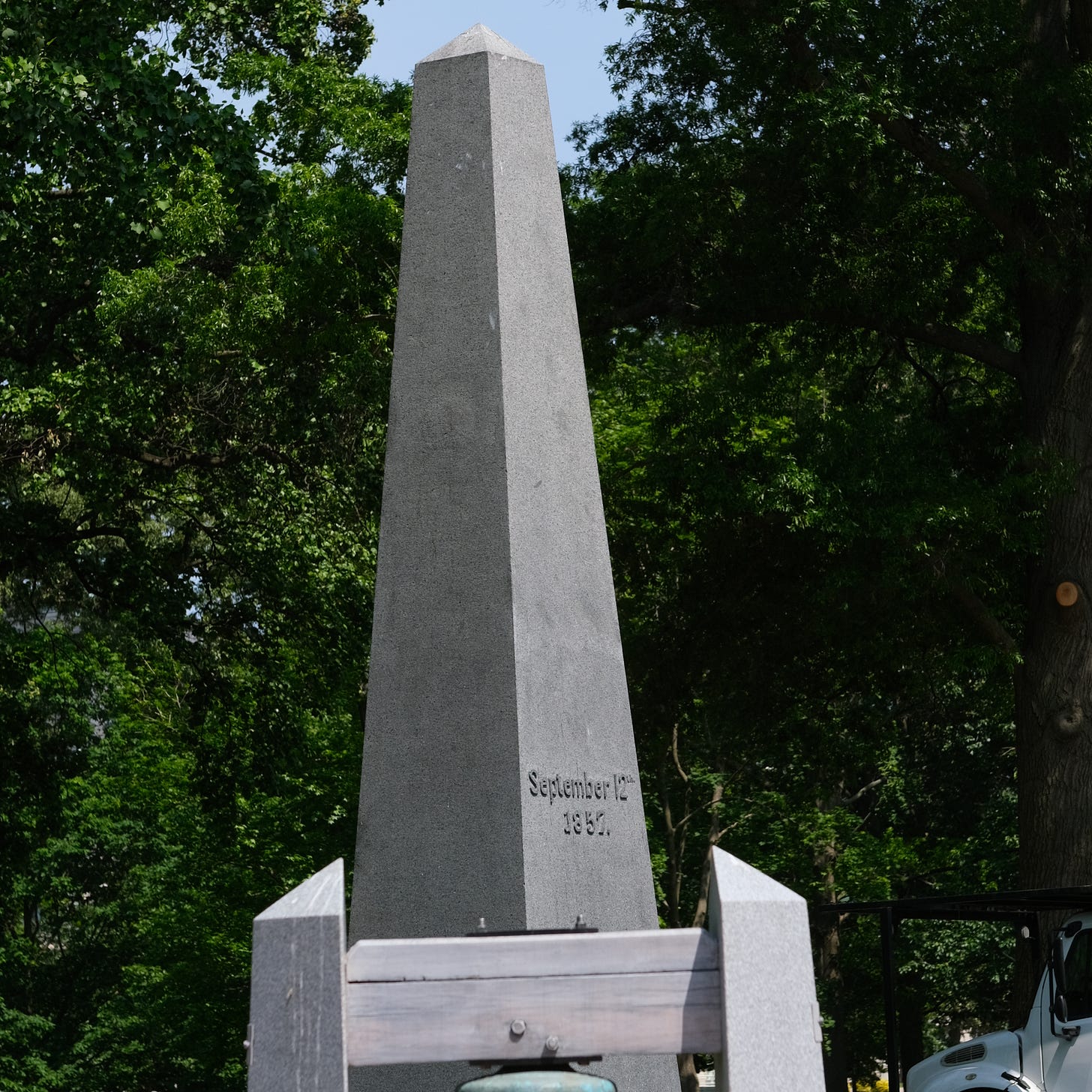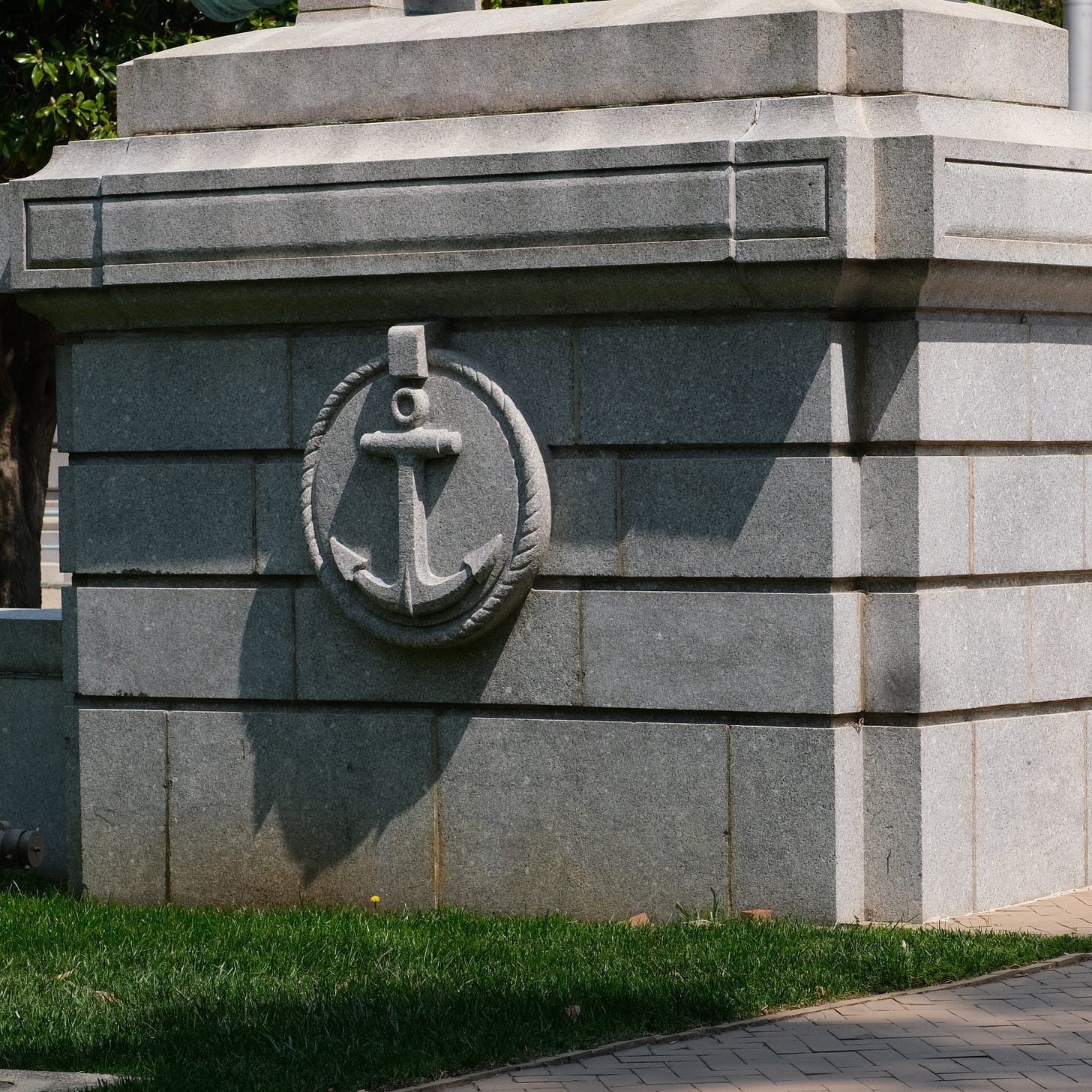I spent the afternoon on the grounds of the United States Naval Academy about a mile, as the crows flies, from where I sit now. It was quiet but beautiful. Not every school has an exquisite location on the water but the Academy, dating to 1845, sits at the confluence of the Severn River and Spa Creek. It is largely landfill but magnificently adorned and a memorable place for more than 4,000 Midshipmen (yes, it’s still a masculine noun) to spend four intensive years of study.
The relatively few students I saw were making their way across various bridges and walkways with a bit of lightness in their steps, indicating they likely have finished exams. I heard one guy yell to another ‘It’s over’ so obviously he was finished but I saw several others carrying heavy packs and seeming deep in thought as they passed
.
It was just like any other campus except it’s not like any other campus.1 Competition for admission to each of these schools is off the chart tough—repeat, some of the most competitive. Cadets live in a highly regimented environment to assure the best academic preparation and their discipline for the future. Yes, they have lots of sports and activities but those are anything but leisure: the athletic prowess of Naval Academy athletes assures their fitness for the future. I am not surprised that Navy’s men won the national rugby championship last week but those on the team did it while carrying the same rigourous academic load that would blow most kids out of the water at even the most prestigious civilian institutions. Summers are not free for trips backpacking across the Thai border into Laos but spent aboard various vessels to learn the options for their commissions.
I did not go by the Navy-Marine Corps Memorial Stadium, about three quarters of a mile to the west, but I imagine the preparations for graduation, along with the commissioning ceremony a fortnight from tomorrow, are well underway. Sure, the soon-to-be graduates are roughly 22 years old, dreaming of future successes while probably carrying some questions about the future. But their futures, with orders now in hand, are radically different from those of someone departing a quiescent campus in the Boston or Portland suburbs. These graduates have jobs that, unless they commit a felony, will assure them at least four years’ salary; this is the payback for this education
.
You and I paid for these kids to earn a solid education. Attending the Academy—our U.S. Naval Academy—has similarities to other places of higher education but only so far. We pay for them to get a superb education so they can serve the nation when called upon. In some cases, depending on the scenario, those same women and men graduating a fortnight from tomorrow will give their lives for us. That is the bargain we strike with them for this education
.
One of the lines of the commissioning oath (repeated at promotions, by the way) is ‘…I take this obligation freely, without any reservations or purposes of evasion…’ It is a voluntary act to serve in the U.S. military at any rank or in any service (civilians take a similar oath). The Reserve Office Training Corps graduates from across the nation take the same oath to the Constitution of the United States, not to you, me, or any individual or political party.
We ask them to commit to our defense against enemies foreign and domestic. We ask them, perhaps, to lay their lives on the line or to lead young men and women into battle for us. We set the objectives and they do their best to carry them out.
Fewer than 8% of the nation took that oath at some point in their lives (as of 2018) because we have an all volunteer force.2 If I remember the statistics, fewer than one in three high schoolers today is physically fit or legally able due to behaviours (incarceration, drugs, mental health, etc.) to serve in uniform which is a reason the services, except the Marines, are all finding recruitment at the enlisted level problematic. The Academies still draw many applicants but others are not as keen or able to enlist these days.
Whether in uniform as enlisted or an officer, we ask these people to defend us, our families, and our interests. I hope we do our part to assure we think through the interests so they are worthy of potentially asking them to sacrifice the most precious thing each of them can offer. Have we thought through our side of the bargain as fully as we assume? We cannot take our responsibility blithely.FIN
These comments largely also apply to the U.S. Military Academy at West Point, the Air Force Academy in Colorado Springs, or the Coast Guard Academy in New London, Connecticut. There is no Marine Corps Academy as Naval Academy midshipmen may also take commissions in the Corps.
Veterans’ Census, retrieved at https://www.census.gov/topics/population/veterans.html









Thank you
Cinders, Nice piece. We have a tendency to forget that there are you people in our country who willingly take the oath and commit to serving our nation. You observations made me feel at ease and grateful to those who defend our country. Thanks for the mental adjustment. Bill